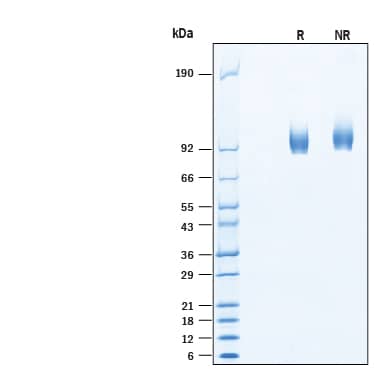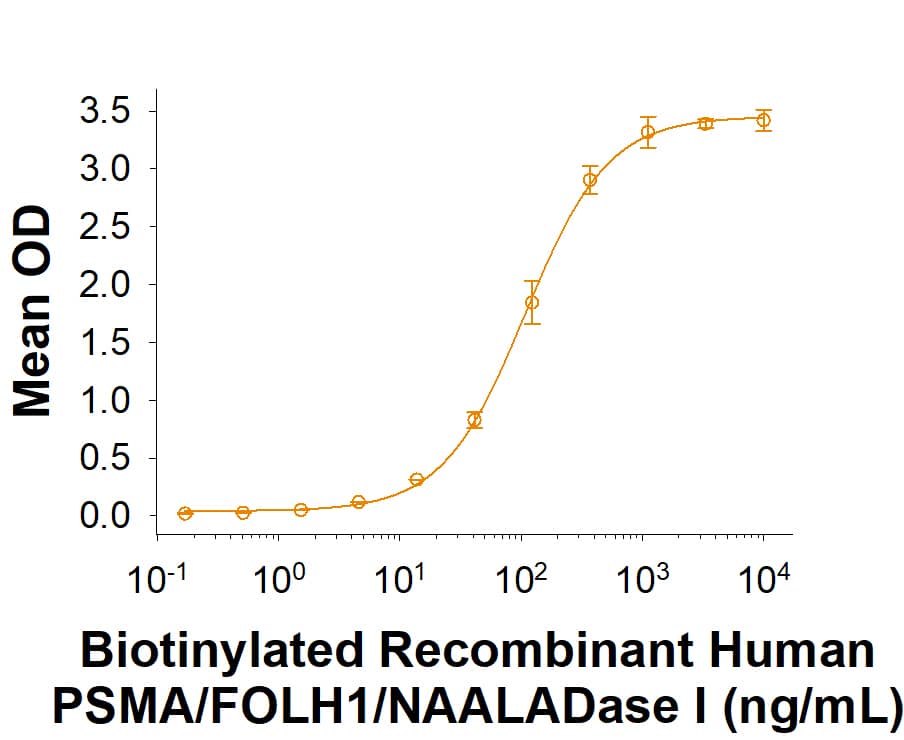Recombinant Human PSMA/FOLH1/NAALADase I His Protein, CF
R&D Systems, part of Bio-Techne | Catalog # BT4234
Biotinylated

Key Product Details
Source
CHO
Accession #
Structure / Form
Biotinylated via amines.
Conjugate
Biotin
Applications
Binding Activity, Enzyme Activity
Product Specifications
Source
Chinese Hamster Ovary cell line, CHO-derived human PSMA/FOLH1/NAALADase I protein
Lys44-Ala750 with an N-terminal 6-His tag
Lys44-Ala750 with an N-terminal 6-His tag
Purity
>95%, by SDS-PAGE visualized with Silver Staining and quantitative densitometry by Coomassie® Blue Staining.
Endotoxin Level
<0.10 EU per 1 μg of the protein by the LAL method.
N-terminal Sequence Analysis
His
Predicted Molecular Mass
80 kDa
SDS-PAGE
94-104 kDa, under reducing conditions
Activity
Measured by its ability to hydrolyze the substrate N-acetyl-L-Asp-L-Glu into N-acetyl-L-Asp and L-Glu. The L-Glu product is measured by fluorescence after its derivatization by ortho-phthaldialdehyde.
The specific activity is >250 pmol/min/μg, as measured under the described conditions.
Measured by its binding ability in a functional ELISA.
Biotinylated Recombinant Human PSMA/FOLH1/NAALADase I (Catalog # BT4234) binds Human PSMA/FOLH1/NAALADase I Antibody (Catalog # MAB4234) with an ED50 of 50.0-600 ng/mL.
The specific activity is >250 pmol/min/μg, as measured under the described conditions.
Measured by its binding ability in a functional ELISA.
Biotinylated Recombinant Human PSMA/FOLH1/NAALADase I (Catalog # BT4234) binds Human PSMA/FOLH1/NAALADase I Antibody (Catalog # MAB4234) with an ED50 of 50.0-600 ng/mL.
Scientific Data Images for Recombinant Human PSMA/FOLH1/NAALADase I His Protein, CF
Biotinylated Recombinant Human PSMA/FOLH1/ NAALADase I Protein Binding Activity.
Biotinylated Recombinant Human PSMA/FOLH1/ NAALADase I Protein (Catalog # BT4234) binds Human PSMA/FOLH1/NAALADase I Antibody (MAB4234) with an ED50 of 50.0-600 ng/mL.Biotinylated Recombinant Human PSMA/FOLH1/ NAALADase I Protein SDS-PAGE.
2 μg/lane of Biotinylated Recombinant Human PSMA/FOLH1/NAALADase I Protein (Catalog # BT4234) was resolved with SDS-PAGE under reducing (R) and non-reducing (NR) conditions and visualized by Coomassie® Blue staining, showing bands at 94-104 kDa, under reducing conditions.Formulation, Preparation and Storage
BT4234
| Formulation | Supplied as a 0.2 μm filtered solution in MES and NaCl. |
| Shipping | The product is shipped with polar packs. Upon receipt, store it immediately at the temperature recommended below. |
| Stability & Storage | Use a manual defrost freezer and avoid repeated freeze-thaw cycles.
|
Background: PSMA/FOLH1/NAALADase I
References
- Silver, D.A. et. al. (1997) Clin. Cancer Res. 3:81.
- Carter, R.E. et. al. (1996) Pro. Natl. Acad. Sci. USA. 93:749.
- Mesters, J.R. et. al. (2006) EMBO J. 25:1375.
- Shulke, N. et. al. (2003) Proc. Natl. Acad. Sci. USA 100:12590.
- Vornov, J.J. et. al. (2020) Neurochem. Res. 45:1256.
- Jackson, P.F. and Slusher, BS (2001) Curr. Med. Chem. 8:949.
- Neale, J.J. and T Yamamoto. (2020) Prog. Neurobiol. 184:101722.
- Heston, W.D. (1997) Urology 49:104.
Long Name
Prostate-specific Membrane Antigen
Alternate Names
FGCP, FOLH1, GCP2, GCPII, mopsm, NAALAD1, NAALADase I
Gene Symbol
FOLH1
UniProt
Additional PSMA/FOLH1/NAALADase I Products
Product Documents for Recombinant Human PSMA/FOLH1/NAALADase I His Protein, CF
Product Specific Notices for Recombinant Human PSMA/FOLH1/NAALADase I His Protein, CF
For research use only
